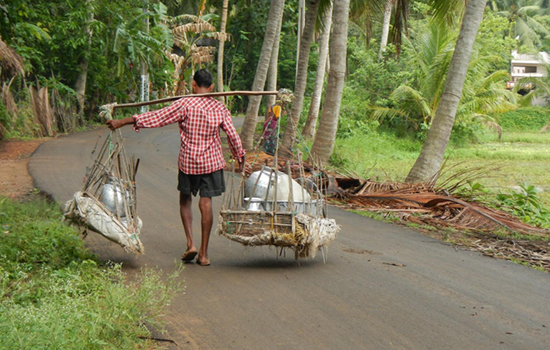by Alyssa Speicher, Public Relations Writer
Many people across the world are without clean, usable water. In India alone, 4,104 children die every day of waterborne diseases. Cedarville assistant professor of nursing Pete Savard is working toward a sustainable solution to this problem.
Savard founded the Global Water Consortium (GWC), a nonprofit organization that helps start small businesses to manufacture and distribute safe water in areas of the world that need it, in September of 2014. These businesses will be owned by people native to the area, and they will one day be able to sustain themselves.
GWC provides a local businessman with a water purifying system that can purify up to 21,600 gallons a day. The system is transportable by either bike or canoe, so the clean water can reach multiple villages. The local businessperson then sells the water at a profit large enough to sustain the business and promote GWC’s values in local communities.
After three years with GWC guidance, the local entrepreneur provides the financial evidence to show investors that his or her business is viable.
Savard has seen well-intentioned missionary projects fail because local people didn’t understand why or how to use the equipment they were given. To combat these issues, GWC offers training in equipment use and business bookkeeping while teaching the local people the value of clean water.
“I tell my students to use what talents you have, and God will figure out the rest,” said Savard. And when he founded GWC, that’s just what he did.
The pilot of GWC’s clean water project will launch in Kadali, India, a village within reach of five other villages. The Kadali project is currently halfway funded. Local pastor Shravan Kumar is the point of contact in Kadali.
“Water is primary,” said Kumar. “There are so many water-borne diseases.” He notes that when people are healthy, they can use the money they had for medical bills to purchase goods and services that will improve their lives.
Savard is also working with two other professors, Cliff Fawcett and Dr. Elisha Injeti, and Cedarville University’s Global Outreach program to establish an interdisciplinary mission trip to Kadali with sophomore students this summer. The students and professors will host general health clinics, women’s health clinics and IT workshops in Kadali.
Located in southwest Ohio, Cedarville University is an accredited, Christ-centered, Baptist institution with an enrollment of 3,760 undergraduate, graduate, and online students in more than 100 areas of study. Founded in 1887, Cedarville is recognized nationally for its authentic Christian community, rigorous academic programs, strong graduation and retention rates, accredited professional and health science offerings, and leading student satisfaction ratings. For more information about the University, visit www.cedarville.edu.
Savard founded the Global Water Consortium (GWC), a nonprofit organization that helps start small businesses to manufacture and distribute safe water in areas of the world that need it, in September of 2014. These businesses will be owned by people native to the area, and they will one day be able to sustain themselves.
GWC provides a local businessman with a water purifying system that can purify up to 21,600 gallons a day. The system is transportable by either bike or canoe, so the clean water can reach multiple villages. The local businessperson then sells the water at a profit large enough to sustain the business and promote GWC’s values in local communities.
After three years with GWC guidance, the local entrepreneur provides the financial evidence to show investors that his or her business is viable.
Savard has seen well-intentioned missionary projects fail because local people didn’t understand why or how to use the equipment they were given. To combat these issues, GWC offers training in equipment use and business bookkeeping while teaching the local people the value of clean water.
“I tell my students to use what talents you have, and God will figure out the rest,” said Savard. And when he founded GWC, that’s just what he did.
The pilot of GWC’s clean water project will launch in Kadali, India, a village within reach of five other villages. The Kadali project is currently halfway funded. Local pastor Shravan Kumar is the point of contact in Kadali.
“Water is primary,” said Kumar. “There are so many water-borne diseases.” He notes that when people are healthy, they can use the money they had for medical bills to purchase goods and services that will improve their lives.
Savard is also working with two other professors, Cliff Fawcett and Dr. Elisha Injeti, and Cedarville University’s Global Outreach program to establish an interdisciplinary mission trip to Kadali with sophomore students this summer. The students and professors will host general health clinics, women’s health clinics and IT workshops in Kadali.
Located in southwest Ohio, Cedarville University is an accredited, Christ-centered, Baptist institution with an enrollment of 3,760 undergraduate, graduate, and online students in more than 100 areas of study. Founded in 1887, Cedarville is recognized nationally for its authentic Christian community, rigorous academic programs, strong graduation and retention rates, accredited professional and health science offerings, and leading student satisfaction ratings. For more information about the University, visit www.cedarville.edu.


















